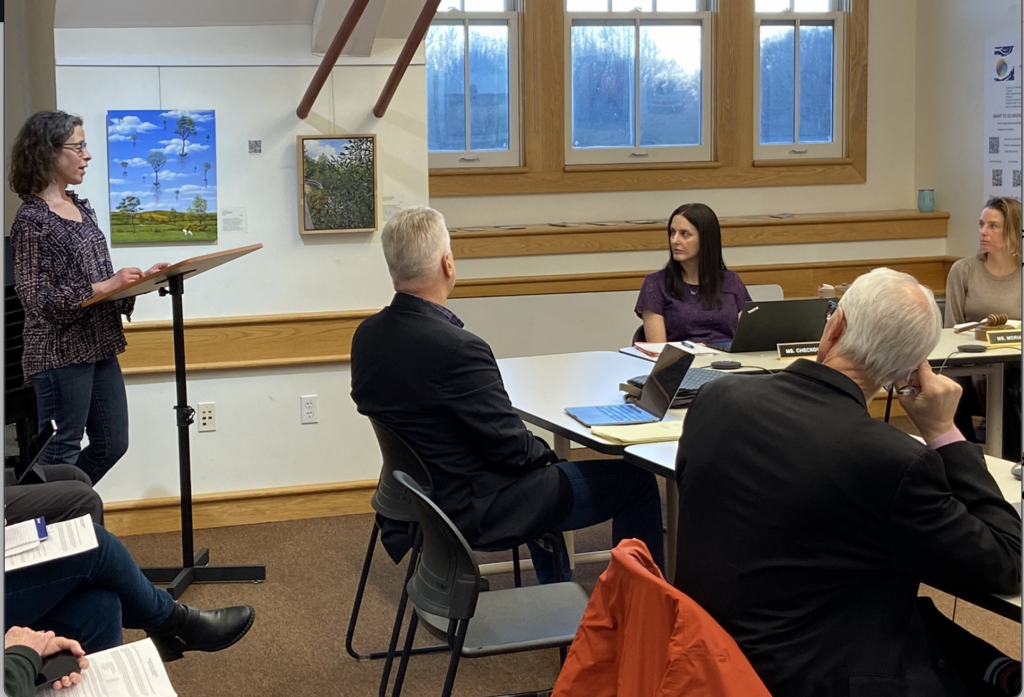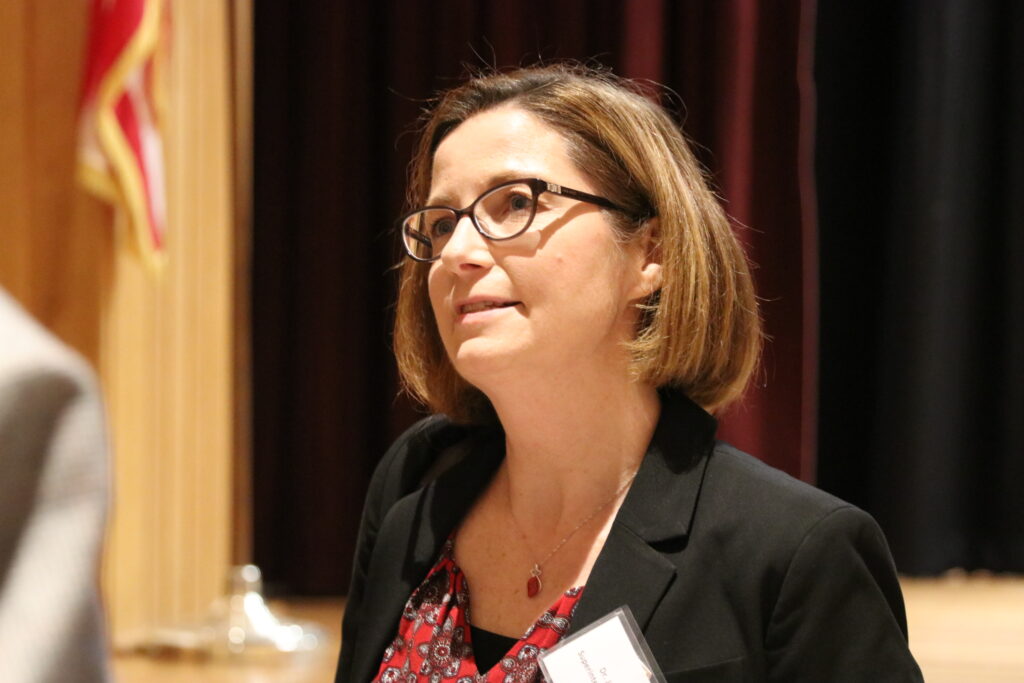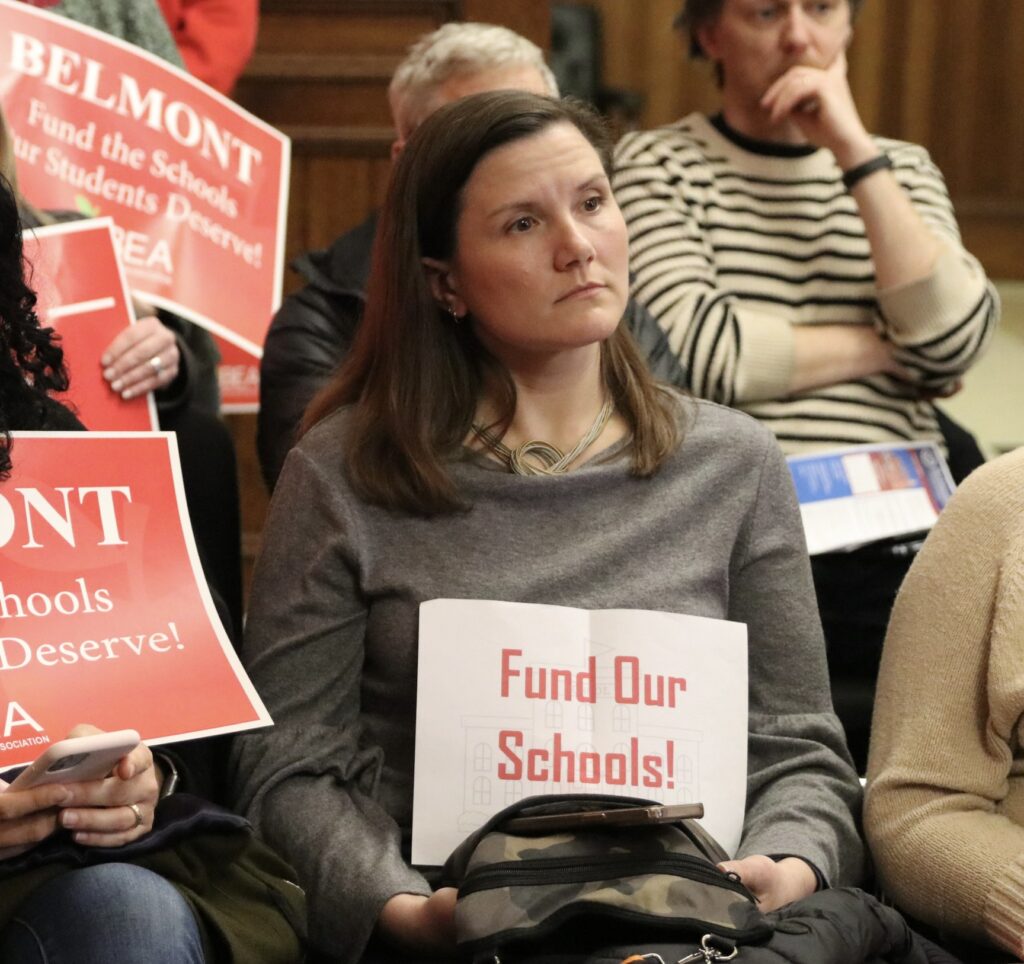Photo: (In no particular order: Superintendent Dr. Jill Geiser; Jim McDonald, MSBA; School Committee Chair Meghan Moriarty; retired Superintendent John Phelan; Building Committee Chair Bill Lovallo; and BMHS students Charlie and Ellie Shea, Jane and Allison Caputo, Maybe Thurston, Elizabeth Zuccarello, and Sarah Lovallo cutting the ribbon opening the new Belmont Middle and High School on Sept. 6, 2023)
Under a blazing hot summer sun, a decade of planning, financing, and construction culminated in the ceremony cutting of the ribbon opening Belmont’s newest school, the Middle and High School, held on the opening day of the 2023-24 school year, Wednesday, Sept. 6.
“This is your building now. Congratulations,” Bill Lovallo, the Middle and High School Building Committee chair, told the assembled students and teachers. Lovallo, along with vice chair Pat Brusch, led the team that shepherded the project after 3/4 of town voters approved a $212 million debt exclusion in November 2018. Construction started in June 2019.
“Your vote made an impactful statement to Belmont and the surrounding communities, approving at the time one of the largest public school projects in the state,” said Lovallo. “Why? Because this community is committed to investing in our future, particularly the future involving our children.”
Costing $295 million to construct, the 450,000-square-foot building will house more than 2,300 students in grades 7-12. Including the hundreds of geothermal wells that will heat and cool the building, more than 2,000 solar panels will be a major electrical power source when its installation is completed at the beginning of 2024.
While the project – designed by Perkins+Will and constructed by Skanska USA – came in “on time and on budget,” according to the building committee, there currently is projected a $1.9 million deficit as a result of a reduction in the $83 million initially promised by the Massachusetts School Building Authority. The shortfall – due to a dispute on what areas of construction are deemed reimbursable – will be resolved in the next 18 months.
Yet that is a future concern as Wednesday saw town and school department officials, employees, and dozens of middle and high school students celebrate the opening of the school year and the completed school held outside of the high school’s dining area overlooking Clay Pit Pond.
“It’s easy for us to see, looking at this building, that the physical spaces of teaching and learning have changed education,” said Meghan Moriarty, chair of the School Committee. “In the coming year, on behalf of the School Committee, we want to help the Belmont community to see how teaching and learning has changed to meet the needs of all of our Belmont students. And how this innovative space and our educators are catalysts in that change.”
In the end, seven Middle and High School students, along with officials, took scissors to ribbon and welcomed the newest school to the Belmont district.
On a side note, 12 years nearly to the day as a kindergartener helping cut the ribbon to open the new Wellington Elementary School in 2011, Sarah Lovallo joined six of her fellow schoolmates in the ribbon cutting for another new school.

The current members of the Belmont Middle and High School Building Committee are:
| Amy Zuccarello | School Committee Member |
| Patricia Brusch | Committee Vice Chair, Permanent Building Committee Chair, Capital Budget Committee |
| Thomas Caputo | Select Board Member, CMS parent |
| Joseph DeStefano | Planning Board, construction experience, CMS and BHS parent |
| David Blazon | Director of Facilities |
| Patrice Garvin | Town Administrator, MCPPO Certified |
| Bill Lovallo | Committee Chair, Permanent Building Committee, engineering experience, CMS parent |
| Michael McAllister | Principal, Chenery Middle School |
| Robert McLaughlin | Permanent Building Committee, Warrant Committee |
| Christopher Messer | Committee Secretary, operations and real estate experience, BHS parent |
| Diane Miller | Architecture experience, CMS and BHS parent |
| Joel Mooney | Permanent Building Committee, engineering experience |
| Jill Geiser | Superintendent of Schools |
| Ellen Schreiber | Warrant Committee Member, CMS Parent |
| Jamie Shea | Foundation for Belmont Education, BHS teacher, Burbank, CMS, and BHS parent |
| Emma Thurston | Committee Treasurer, business experience, BHS Parent |




